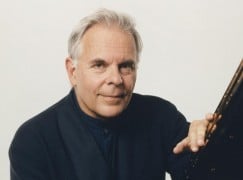When it comes to performance tension, no artist is more candid
mainOne of my favourite Lebrecht Interviews was with Stephen Kovacevich, an artist so open about his anxieties that you are on constant alert to broach sensitive areas with care in order to risk no harm. And then Stephen, once he relaxes, comes out with an anecdote more self-revealing than anything the most aggressive interrogator could ask for.
Here’s a performance tension story he has just shared with Melanie Spanswick:

I remember I heard Bartok’s second concerto when I was about 23, 24 and I thought, “What a sensational piece!” and I bought the music, and I wasn’t being coy. I can’t do it, and in those days I occasionally dropped in on Colin Davis and I dropped in and I said, “I just heard this incredible piece and I went out and bought the music. I can never play.” I wasn’t fishing. He was in charge of the BBC and he asked me to do it at a Prom 9 months later. Well, I accepted. I knew I could always cancel it, but I’d never forgive myself if I didn’t try. Twice during that period – thank god I don’t remember which hand – it was paralyzed. I couldn’t hold an orange. I woke up the morning and it looked like this or like this, whichever hand, and I had massage and a lot of treatment. The doctor who I was seeing at the time said, “Well, you can play the first performance. It’ll hurt, but you won’t damage yourself.” It did hurt. It wasn’t the world’s greatest performance, but I got through. The next performance was terrible, and then – you were speaking of nerves – the next performance was live and for a festival opening night. I was so scared that I couldn’t give the BBC – this is with Bartok 2 – a balance test. Everybody had to do it cold, just like that.
And I walked on stage with my speech of abdications saying my hand hurts, you know. And there’s two things that I find very difficult, one is on the third page and a lot of – even people who have much more experience with that kind of music – they wobbled a bit in these parts. It’s not important, but it’s very awkward. And then I had another problem a bit later, and I’d worked all summer on this piece. And Martha Argerich was sitting in the public with another pianist who died, you wouldn’t know him, and they knew about my bête noires in this piece, and when the second one came up, they held each other, and I got through it. And when I got through it I get completely ballistic. And I walked away thinking, “Now I know how to do it.” Well, no. [Laughter] Yes, I know how to do it if you want to work the whole summer on one piece, but you can’t live like that.





This is a beautiful story, Stephen. We do walk out onstage practically naked with our souls, feelings, our life basically sprawled out over 88 keys between us and our audience. It is almost as if we never practiced the piece, even if we’ve known it for 40 years or more. Isn’t it so? How many listeners truly know these feelings we experience before and during performances? I suppose they don’t have to. As of late, I find I close my eyes more and more during performance, which can’t be helped, it is an instinctive reaction. I think you did a superhuman feat by learning the concerto so quickly. An elderly lady in Ashland, Oregon, told me that she has practiced Qi Dong. I know little about it, but she said I do the channeling in performance. There must be something about this which somehow removes our fear and channels the composer’s energy and spirit through our thoughts and output at the moment of baring our souls. You must have experienced this euphoria after those treacherous passages in the concerto!
One of the most extraordinary artists I’ve have the pleasure (and honor) of interviewing. Thank you for posting this, Norman. Simply wonderful.